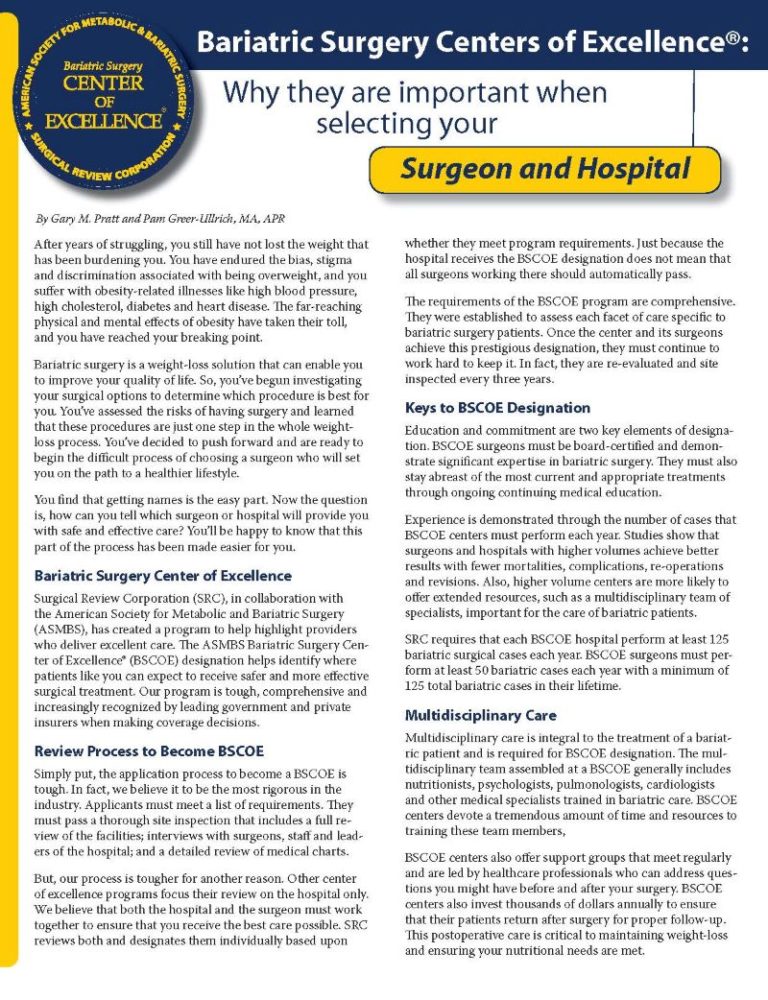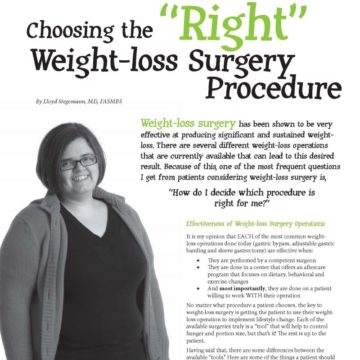Bariatric Surgery Centers of Excellence®: Why they are important when selecting your surgeon and hospital.


by Gary M. Pratt and Pam Greer-Ullrich, MA, APR
Fall 2009
After years of struggling, you still have not lost the weight that has been burdening you. You have endured the bias, stigma and discrimination associated with being overweight, and you suffer with obesity-related illnesses like high blood pressure, high cholesterol, diabetes and heart disease. The far-reaching physical and mental effects of obesity have taken their toll, and you have reached your breaking point.
Bariatric surgery is a weight-loss solution that can enable you to improve your quality of life. So, you’ve begun investigating your surgical options to determine which procedure is best for you. You’ve assessed the risks of having surgery and learned that these procedures are just one step in the whole weight-loss process. You’ve decided to push forward and are ready to begin the difficult process of choosing a surgeon who will set you on the path to a healthier lifestyle.
You find that getting names is the easy part. Now the question is, how can you tell which surgeon or hospital will provide you with safe and effective care? You’ll be happy to know that this part of the process has been made easier for you.
Bariatric Surgery Center of Excellence
Surgical Review Corporation (SRC), in collaboration with the American Society for Metabolic and Bariatric Surgery (ASMBS), has created a program to help highlight providers who deliver excellent care. The ASMBS Bariatric Surgery Center of Excellence® (BSCOE) designation helps identify where patients like you can expect to receive safer and more effective surgical treatment. Our program is tough, comprehensive and increasingly recognized by leading government and private insurers when making coverage decisions. These aren’t general surgeons who “dabble” in bariatric surgery – instead, you’ll hear most BSCOE surgeons refer to their work as a vocational calling.
Review Process to Become BSCOE
Simply put, the application process to become a BSCOE is tough. In fact, we believe it to be the most rigorous in the industry. Applicants must meet a list of requirements. They must pass a thorough site inspection that includes a full review of the facilities; interviews with surgeons, staff and leaders of the hospital; and a detailed review of medical charts. But, our process is tougher for another reason. Other center of excellence programs focus their review on the hospital only. We believe that both the hospital and the surgeon must work together to ensure that you receive the best care possible. SRC reviews both and designates them individually based upon whether they meet program requirements. Just because the hospital receives the BSCOE designation does not mean that all surgeons working there should automatically pass.
The requirements of the BSCOE program are comprehensive. They were established to assess each facet of care specific to bariatric surgery patients. Once the center and its surgeons achieve this prestigious designation, they must continue to work hard to keep it. In fact, they are re-evaluated and site inspected every three years.
Keys to BSCOE Designation
Education and commitment are two key elements of designation. BSCOE surgeons must be board-certified and demonstrate significant expertise in bariatric surgery. They must also stay abreast of the most current and appropriate treatments through ongoing continuing medical education.
Experience is demonstrated through the number of cases that BSCOE centers must perform each year. Studies show that surgeons and hospitals with higher volumes achieve better results with fewer mortalities, complications, re-operations and revisions.
Also, higher volume centers are more likely to offer extended resources, such as a multidisciplinary team of specialists, important for the care of bariatric patients. SRC requires that each BSCOE hospital perform at least 125 bariatric surgical cases each year. BSCOE surgeons must perform at least 50 bariatric cases each year with a minimum of 125 total bariatric cases in their lifetime.
Multidisciplinary Care
Multidisciplinary care is integral to the treatment of a bariatric patient and is required for BSCOE designation. The multidisciplinary team assembled at a BSCOE generally includes nutritionists, psychologists, pulmonologists, cardiologists and other medical specialists trained in bariatric care.
BSCOE centers devote a tremendous amount of time and resources to training these team members, BSCOE centers also offer support groups that meet regularly and are led by healthcare professionals who can address questions you might have before and after your surgery. BSCOE centers also invest thousands of dollars annually to ensure that their patients return after surgery for proper follow-up. This postoperative care is critical to maintaining weight-loss and ensuring your nutritional needs are met.
The Importance of the BOLD™ Database
All BSCOE participants are also required to report their detailed patient outcomes information on a regular basis using SRC’s Bariatric Outcomes Longitudinal Database™ (BOLD™). It helps SRC keep watch on how well these hospitals and surgeons are doing in real-time, but it also serves other important purposes.
BSCOE and Insurance Coverage for Surgery
Several major health insurers have taken notice of the ASMBS BSCOE program and BOLD™. Insurers such as the Centers for Medicare and Medicaid Services (CMS), CIGNA, Humana, Kaiser Permanente, and some Blue Cross and Blue Shield plans, require the BSCOE designation as a first-step for inclusion in their bariatric surgery networks and reimbursement. However, more work is needed to increase access to bariatric surgery. SRC and the Obesity Action Coalition are actively committed to patient advocacy, but your voice is needed.
Conclusion
While the BSCOE designation represents excellence, it doesn’t guarantee perfection. As with any surgery, there are associated risks and complications with bariatric treatment. Care is particularly challenging because morbid obesity usually involves a myriad of other medical problems that need to be addressed.
Patients must also do their part by following their doctor’s orders implicitly to achieve desired outcomes. SRC and the BSCOE program cannot eliminate all bad things from happening, but we are committed to making your experience with bariatric surgery as safe and effective as possible.
Visit www.surgicalreview.org to learn more about the surgeons and facilities that have earned the Bariatric Surgery Center of Excellence designation. Bariatric Surgery Center of Excellence® is a registered trademark of the American Society for Metabolic and Bariatric Surgery (ASMBS).
About the Authors:
Gary M. Pratt is Chief Executive Officer of Surgical Review Corporation, an independent, nonprofit organization governed by industry stakeholders and dedicated to advancing the safety, efficacy and efficiency of bariatric and metabolic surgical care worldwide. A graduate of the University of Tennessee with degrees in marketing and accounting, Mr. Pratt has started several successful businesses and was a partner in a national accounting firm.
Pam Greer-Ullrich, MA, APR, is Manager of Strategic Alliances at Surgical Review Corporation. She is an accredited member of the Public Relations Society of America (PRSA). Greer-Ullrich has more than 20 years of healthcare communications experience, including management positions at the American Association of Preferred Provider Organizations, Trover Solutions and Norton Healthcare. She obtained her B.A. degree in communications from the University of Louisville and Master of Arts in business from Webster University.
by Robyn Pashby, PhD Winter 2024 “No one is ever going to date you if you don’t…
Read Articleby Kendall Griffey, OAC Communications Coordinator Winter 2024 The Obesity Action Coalition’s 12th annual Your Weight Matters…
Read Articleby Nina Crowley, PhD, RD (with Inspiration from Shawn Cochran) Winter 2024 Dating, no matter your age,…
Read Article








